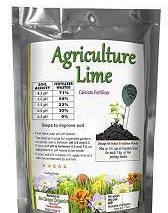By KilimoKwanza.org Correspondent
Tanzania’s agricultural sector has faced a longstanding challenge: soil acidity, particularly in regions like Iringa and Songwe. This issue has hindered crop growth and reduced yields for key staples like maize, with farmers often struggling to produce even 2 tonnes of maize per hectare. However, a transformative solution has emerged through agricultural lime, which neutralizes acidic soils and unlocks the potential for higher productivity.
Lime’s Impact on Maize Yields: From 2 to 7 Tonnes Per Hectare
Projects spearheaded by SAGCOT (Southern Agricultural Growth Corridor of Tanzania) and TARI (Tanzania Agricultural Research Institute) have demonstrated the powerful effects of agricultural lime. By applying lime to treat acidic soils, maize yields have dramatically increased. In areas where farmers previously harvested 2 tonnes per hectare, they are now reaping 7 to 8 tonnes per hectare—a nearly 300% improvement.
These gains are crucial for smallholder farmers, whose livelihoods depend on higher productivity. Lime restores soil pH levels, improving the effectiveness of fertilizers and allowing better nutrient absorption by crops. As a result, farmers experience not only increased yields but also better-quality crops, higher marketability, and enhanced food security for their families and communities.
Leveraging Tanzania’s Natural Resources: Limestone Deposits as an Economic Opportunity
Tanzania’s vast limestone reserves make agricultural lime an even more compelling solution. With 33 known limestone deposits spread across the country, particularly along the eastern coast and near Lake Victoria, the potential to produce lime locally is immense.
This would significantly lower the costs of lime production and distribution, making it affordable for more farmers.
Dr. Meliyo, a prominent soil expert, points out that Tanzania could turn its soil acidity problem into an economic boom by developing a robust lime production industry. Not only could this industry serve local agricultural needs, but it could also expand to supply neighbouring countries facing similar soil challenges.
. With strategic investments in limestone mining and processing, Tanzania could position itself as a regional hub for lime production, creating jobs and boosting the economy.
Scaling Lime Application Across the Country
The success of lime application in Iringa and Songwe signals the need to scale this intervention nationwide. Experts estimate that 32.7 million hectares of Tanzanian farmland are affected by soil acidity, limiting the potential productivity of millions of farmers
. By scaling up lime use, Tanzania could significantly boost maize production across the country, making the nation more self-sufficient in staple foods and improving food security.
Additionally, lime application is not a one-time fix. As Dr. Meliyo explains, the effectiveness of lime depends on factors like the type of nitrogen used in fertilizers and the specific crops grown. Regular monitoring of soil pH levels is necessary to ensure that soils remain healthy, and lime may need to be reapplied periodically to maintain optimal soil conditions
A Broader Vision: Kilimo Kwanza and the Future of Sustainable Agriculture
The application of agricultural lime aligns with Tanzania’s Kilimo Kwanza (Agriculture First) initiative, which emphasizes modernizing and transforming agriculture through sustainable practices and investments in soil health
. By combining the use of lime with other soil management techniques—such as conservation agriculture and organic fertilizers—the country can build a more resilient agricultural system capable of withstanding the challenges of climate change and resource constraints.
Through strategic partnerships among government agencies, research institutions, and the private sector, Tanzania has the opportunity to revolutionize its agricultural practices. The use of lime, combined with better access to soil testing and farmer education programs, could become the cornerstone of this transformation. As Tanzania continues to invest in its agricultural future, solutions like agricultural lime will play a key role in ensuring that farmers can maximize their land’s potential, increase food production, and secure long-term economic growth.
By turning soil acidity from a challenge into an opportunity, Tanzania is paving the way for a more prosperous, food-secure future.
